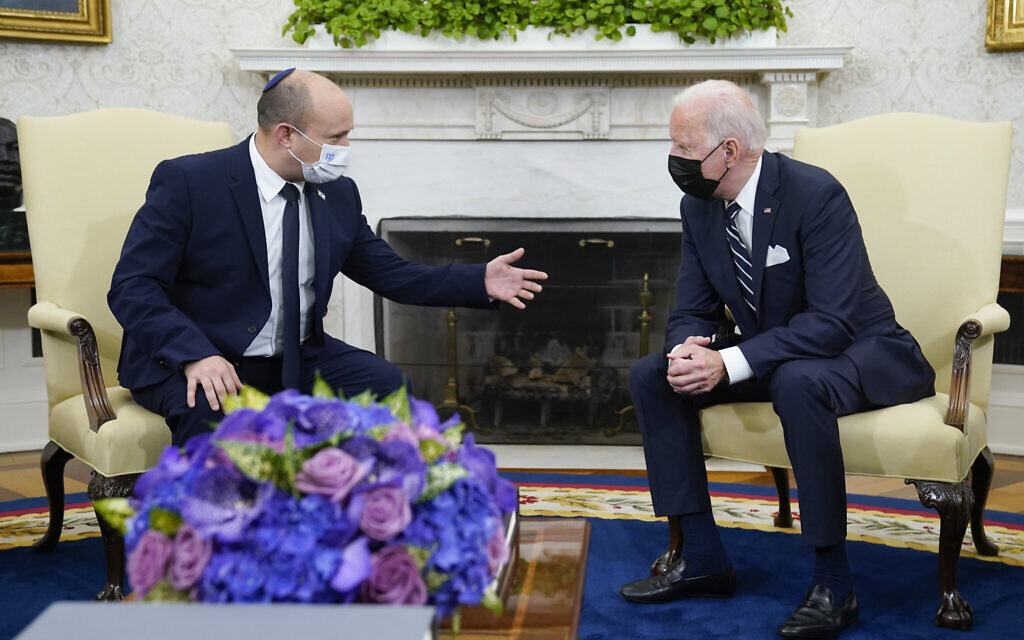Latest settlement approvals have US officials doubting Gantz’s claim that he can limit scope of construction, and jeopardize ‘spirit of goodwill’ Biden hoped to build with Bennett

Over the past four months, Defense Minister Benny Gantz has sought to assure the Biden administration that although the new Israeli government is now led by an opponent of the two-state solution, he would use his position overseeing much of the policy vis-à-vis the West Bank and Gaza Strip to keep prospects for such a resolution alive.
Gantz has advanced a series of measures aimed at strengthening the Palestinian Authority, from authorizing thousands of additional entry permits for Palestinian workers, to legalizing the status of thousands of undocumented Palestinians, to green-lighting building permits for Palestinians in Area C, to sending a $155 million advance to help the cash-strapped PA remain afloat.
Some of the steps might be more marginal than others — and they have been diminished in Ramallah’s eyes due to the Defense Ministry’s recent blacklisting of six Palestinian human rights organizations — but these types of initiatives from Jerusalem have not been seen in well over a decade.
They have led the Biden administration to view the defense minister as a key address of engagement in Israel, someone who is capable of delivering on his word and who is a partner in the US policy of maintaining the viability of a two-state solution.
The defense minister assured American counterparts in recent months that while settlement building would continue under the government of Prime Minister Naftali Bennett, a former director of the Yesha Council settler umbrella group, it would largely be limited to areas within the so-called blocs closer to the Green Line, rather than isolated communities deep in the West Bank that further complicate plans to form a viable, contiguous Palestinian state, an Israeli defense official told The Times of Israel.
That’s likely why US officials reacted with dismay and anger when they reviewed the list of projects published last week by a panel within Gantz’s office that suggested the defense minister had failed to deliver on his word. The projects were approved Wednesday.

“This shows that either he’s not really the one pulling the strings or that he was willfully deceiving us,” a US source familiar with the matter told the Times of Israel on Thursday.
Of the plans for roughly 3,000 settlement homes that were advanced by the panel, the vast majority are located deep in the West Bank in towns such as Har Bracha, Elon Moreh, Beit El, Talmon and Eli.
Official US policy does not differentiate between construction in the blocs and construction deep in the West Bank, but comments from Biden officials that followed the settlement announcements indicated that the latter category is particularly harmful and risks squandering the “spirit of goodwill” that Bennett has sought to build with the new administration in Washington.
‘Our messaging is consistent with what transpires’
The settlement approvals were the first since Biden took office, but they weren’t the first steps taken by Israel that sparked condemnation from Washington. In previous such instances though — whether it was settler violence, Israeli home demolitions, the potential evictions of Palestinians in East Jerusalem or other settlement-related announcements — the response from the State Department was to issue the same statement calling on both parties to “avoid unilateral steps that exacerbate tensions and make it more difficult to preserve the viability of a two-state solution.”
This time was different.
“We are deeply concerned about the Israeli government’s plan to advance thousands of settlement units on Wednesday, many of them deep in the West Bank,” State Department spokesman Ned Price said at a Tuesday briefing, in remarks that were not coupled with an equivalent warning to the PA against similar unilateral steps.
“We strongly oppose the expansion of settlements, which is completely inconsistent with efforts to lower tensions and restore calm. And it damages the prospects for a two-state solution,” Price added.
After a reporter noted that the statement was the furthest the Biden administration has gone on the issue, the State Department spokesman responded, “Our public messaging on this is consistent with what we are seeing transpire,” indicating that the previous messaging was no longer sufficient.

Conversations on the matter continued behind closed doors too.
US Embassy in Jerusalem Chargé d’Affaires Michael Ratney phoned Bennett’s senior foreign policy adviser Shimrit Meir last week, raising US objection not only to the large number of plans slated for advancement — almost a thousand more than what was originally on the docket in August — but also the location of many of the projects well beyond the Green Line, a senior Israeli official told ToI on Tuesday.
But it didn’t stop with Ratney or even US Deputy Assistant Secretary Hady Amr, who is the Biden administration’s point-man on the Israeli-Palestinian conflict. The matter rose all the way to the seventh floor of the State Department.
Secretary of State Antony Blinken phoned Gantz on Tuesday voicing similar objections regarding the scope and location of the settlement approvals, another Israeli official confirmed.
Gantz in turn pointed to the upcoming building approvals for Palestinians and assured that additional concessions were on the horizon while pledging to take greater stock in American concerns in the future, the Israeli official said.
“The Americans gave us a yellow card,” the Axios news site quoted a senior Israeli official as having said of the “tense” conversation, a reference to the warning card issued in soccer.
To worry, or not to worry
Still, an Israeli source familiar with the matter noted to ToI Thursday that the condemnations thus far from the Biden administration have been coming exclusively from the “often critical” State Department, while the White House has remained silent.
“Biden and those around him in the White House understand that we’re in a complex situation here with this government and that certain measures are required to keep it afloat,” the Israeli source said, referring to the coalition of eight parties spanning almost the entirety of the political spectrum, including several right-wing pro-settlement parties.
The source, who spoke on condition of anonymity, went on to argue that the Biden administration would not want to exhaust its political capital over settlements this early on. “Over this issue, they’re not going to upset the apple cart.”

But a former US official familiar with the matter maintained that Jerusalem was misreading the situation.
“Antony Blinken is closer to the president than any other adviser,” the former official said, dismissing the notion that Israel should take the secretary’s call lightly.
As for the Israeli assumption that the Biden administration does not want to see Bennett’s government fall apart, the former official acknowledged, “sometimes that’s a political calculus of ours, but other times it serves as a convenient political cover by Israel.”
Nonetheless, it is a combination of the continued US interest in keeping the coalition alive and Biden’s “instinct” to avoid public confrontation with the Jewish state that will likely prevent this episode from escalating beyond Blinken’s call, the former official speculated.
“But the reaction did jar some Israelis. It was harsher and tougher than expected,” the former US official said. “The point was to create a deterrent that makes them think twice next time.”
Next time, it’ll be Biden
Washington Institute for Near East Policy senior fellow David Makovsky referred to the settlement issue as the “Achilles heel” of relations between Biden and Bennett, even though they are both interested in “having harmonious ties reflected publicly.”
“It’s not the only issue, but one that could really hurt this bilateral relationship and could also be used against Biden within Washington by some who believe that he’s not getting enough out of these good ties,” said Makovsky, who served as a senior advisor to then-secretary of state John Kerry during the 2013-2014 Israeli-Palestinian peace negotiations.
“The Bennett government is playing with fire if it continues doing these approvals where over half are east of [the West Bank] security barrier,” he continued.

Makovsky argued that while the US position is to publicly oppose all settlement building across the board, “in private conversations there is more nuance,” which is why the response to the latest announcements went much further than previous condemnations.
Still, he noted with favor the calls made by Ratney and Blinken in that they were not publicized or leaked by US officials.
“It reflects the US preference to solve things with Israel in closed settings as much as possible,” Makovsky said.
“But next time it could be Biden on the phone, not Blinken,” he added.
As reported by The Times of Israel
